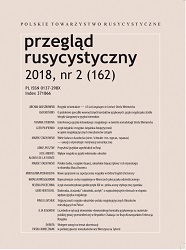К вопросу о специфике внутренних языковых контактов: русский язык как источник сленгизмов латышского языка
Problems of Specifics of the Internal Language Contacts: the Russian Language as a Source of Latvian Slang Words.
Author(s): Igors KoškinsSubject(s): Language studies, Language and Literature Studies, Foreign languages learning, Lexis, Semantics, Comparative Linguistics, Eastern Slavic Languages, Baltic Languages
Published by: Polskie Towarzystwo Rusycytyczne
Keywords: Uriel Weinreich;bilingualism;Russian language; Latvian language;language acquistion;languages in contact;comparative linguistics
Summary/Abstract: The article deals with the specifics of the Latvian-Russian language contact and one of its results — slang words and barbarisms. The author consideres also motivations of this kind of borrowings from Russian in the Latvian language. Uriel Weinreich pre¬sented the classification of “motivations of lexical borrowings” in his book Languages in contact. Some postulates of Weinreich’s research can be applied to the study of Russian-Latvian language contacts connected with distribution of slang words. A lar¬ge number of the Russianisms entered in colloquial Latvian as a result of oral com-munication. Slavisms in the colloquial speech (slang) have been borrowed because of internal language contacts and bilingualism. Russian language was eveolving in a so¬ciolinguistic situation of collective bilingualism that assumes the existence of internal language contacts. It is possible to classify Russianisms-barbarisms from the point of view of their motivation in several groups, which are described in the article. Various degrees of adaptation of slang words in Latvian show that various types of lexical in¬terference are parts of one dynamic process.
Journal: Przegląd Rusycystyczny
- Issue Year: 2018
- Issue No: 162
- Page Range: 12-24
- Page Count: 13
- Language: Russian

